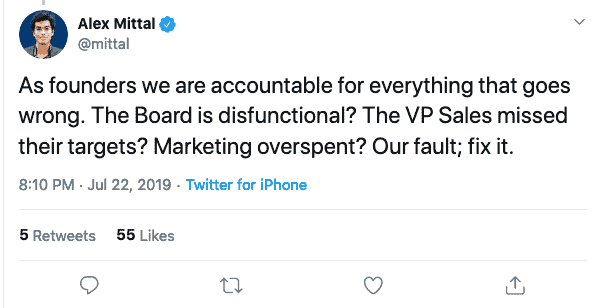When something goes wrong, where do you look?
If you're a good manager, you start by looking in the mirror. You ask yourself how you contributed to the problem, no matter what.
As a leader, you're accountable for everything that happens with your team:
This is an essential lesson for founders, as well as any leader who wants to go far. As Justin Kan, Atrium CEO, former YC partner, and founder of Justin.TV, remarked:
The only thing preventing you from being the leader you dream of is just taking 100% responsibility for everything going on around you.
— Justin Kan (@justinkan) July 12, 2019
(Keep in mind that is just 100% and not more than 100%)
If something goes wrong, you need to take ownership of fixing it, but it's not just on you. You also want your team to take ownership and feel responsible as well, because when you do, magic happens:
Good managers give their employees two things: goals and ownership. Set clear goals for your team’s work and hold them accountable for completing tasks. That said, don’t micromanage your employees. Let them have plenty of space to use their talents and learn new skills.
— Kayden Khor (@kayden_khor) May 5, 2019
Wait...what???
How do you reconcile these two seemingly conflicting ideas? How do you take responsibility for what happens around you while still allowing your team members to own what their work, and the outcomes of it?
The key is to understand that ownership and responsibility aren't the same thing. The responsibility you take upon yourself as a leader is different from the accountability you expect from your team and their responsibility for their work.
Balancing accountability vs. responsibility
In response to Justin Kan's remark on taking 100% responsibility, CMX founder David Spinks asked what you are probably thinking right now, too:
How do you balance taking 100% ownership with empowering your team to feel ownership?
— David Spinks (@DavidSpinks) July 12, 2019
The words "ownership”, "accountability”, and "responsibility” are thrown around a lot. And sometimes, they're used interchangeably, which can be confusing.
Since David is a friend of mine in real life and on Twitter, I saw this question and chimed in to bring some clarity to this confusing and important topic. Here's my response:
You’re missing the meaning David. Responsibility is not ownership at all.
— Jason Evanish (@Evanish) July 12, 2019
Responsibility is saying that you are always contributing to what happens to and around you.
When something goes wrong, good leaders ask, “what part of this problem or outcome did I help contribute to?”
I then continued to explain the nuance:
Put more simply, I’m loving the oft repeated line in @jerrycolonna ‘s book Reboot:
— Jason Evanish (@Evanish) July 12, 2019
“How are you complicit in creating the conditions of your life that you say you don’t want?”
If you want to have a great team, you need to start with yourself. How could you have helped create a better outcome?
And no, that doesn't mean that next time you'll do the task, or micromanage your team to death.
Be proactive in taking responsibility, the right way.
The key to remember is that it's your responsibility to equip your team with everything they need to succeed. Ask yourself if you've done everything you can to put your team in a position to win. As I wrote to David on Twitter:
- Did I support & coach them enough?
- Did I set them up to succeed, or set an unreasonable goal?
- How did my actions undermine their efforts?
These are questions you should ask at the beginning and at the end of every project to figure out how you could best support your team. As the saying goes, "an ounce of prevention is worth a pound of cure"; the earlier you can catch and fix problems, the better.
Today, we take a look at how you can embrace this idea of taking responsibility as a leader, while still giving your team the autonomy to thrive.
Table of Contents:
- Build Psychological Safety with your team
- Make it clear who is accountable for what
- Set a good example
How You can Balance Accountability vs. Responsibility
Balancing accountability with your team vs. taking responsibility as a leader might seem like conflicting efforts, but they're not. With the right mindset and approaches, you can balance the two so you and your team thrive together.
Here's how you can do that:
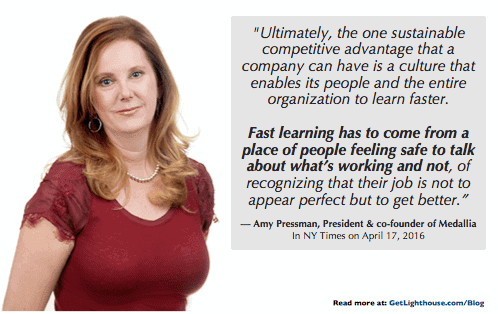
1) Build Psychological Safety with your team
Psychological safety is defined as the ability to, "show and employ one's self without fear of negative consequences of self-image, status, or career.”
The key is that psychological safety helps your team feel comfortable with speaking up and giving their input.
This is essential for giving your team the autonomy they crave to do their work well:
- They will be confident in coming to you early when there's a problem (instead of when it's too late, or a big deal).
- You'll get ideas and input from everyone, instead of feeling like you have to dictate and micromanage everything.
- They will be comfortable asking questions and saying "I don't know" when they need help, making coaching easier for you.
Having a team that does those things has a variety of benefits. Gallup found that teams with psychological safety can result in a, "27% reduction in turnover, a 40% reduction in safety incidents, and a 12% increase in productivity.”
These results make perfect sense:
- If you're comfortable at work, you're less likely to quit.
- When it's safe to speak up, you'll bring up that safety issue you notice, before someone gets hurt.
- If you feel heard, respected, and safe speaking up, you'll put more effort and attention into your work.

Psychological safety helps improve communication and the flow of feedback
In an internal team performance study by Google, researcher Julia Rozovsky and her team identified certain patterns of behavior that separate their worst-performing teams (Team A) from their best-performing (Team B):
"Team A [is] filled with smart people, all optimized for peak individual efficiency. But the group's norms discourage equal speaking; there are few exchanges of the kind of personal information that lets teammates pick up on what people are feeling or leaving unsaid.
…In contrast, on Team B… all the team members speak as much as they need to. They are sensitive to one another's moods and share personal stories and emotions. While Team B might not contain as many individual stars, the sum will be greater than its parts.”
Google's research from 2011 showed that teams with an open-minded culture, or psychological safety, were more likely to achieve success in a project. [Ed. note: Some of their recent problems likely stem from straying from their own findings.]
Psychological safety is only possible by taking responsibility
Teams do not become comfortable by accident. As a leader, you have to work at it. Sometimes that means actively calling on people in meetings so they'll contribute. Other times, it may mean working with someone who tends to dominate conversations to get them to step back a bit.
It also comes into play individually; your team has to be confident coming to you and speaking with you. That comes from not shooting the messenger, developing your skills at asking good questions, and rewarding people for speaking up and contributing.
As you build psychological safety, you'll then find that your team is more prepared to work with you to make sure you deliver on the outcomes you're committed to. It comes from them being willing and helpful communicators in both group settings and directly with you.
Want to learn more about psychological safety? Read our in depth post on "Why you should prioritize psychological safety to have an innovative team" here.

2) Make it clear who is accountable for what
In The One Minute Manager Meets the Monkey, authors Ken Blanchard, William Oncken Jr., and Hal Burrows describe the concept of a "monkey”, which they define as the next move that needs to be carried out for any task or project.
In the book, Blanchard and his co-authors outline a common problem: your team member just came to you with an issue, so you agree to take care of it. However, once you do that, the "monkey” has jumped off their back and onto yours. Responsibility has just passed from them to you.
When this happens, it becomes unclear who exactly is accountable for moving the task forward, which can slow productivity and overload you unnecessarily.

Manage responsibility by managing the monkey
"As a Manager, to the extent that you can get people to care for and feed their own monkeys, they are really managing the work for themselves." - The One Minute Manager Meets the Monkey
A good manager understands that improving their team's productivity isn't done by maximizing their own productivity, but rather multiplying their team's. However, it can be difficult to place responsibility in the hands of your team members, especially if it's a task you need to make sure gets done right.
Blanchard and his co-authors suggest identifying team members who have proven they can take on the additional responsibility and offering them the task (much like Andy Grove's Task Relevant Maturity). Then, make sure these points are covered as they take on the work:
Rules of Monkey Management
- Decide on next moves before all parties separate.
- Who owns the "monkey”? Someone has to be designated as the owner of the task.
- Insurance policies have to be put in place to cover risk to make sure the task is completed well.
- Set a time and place to follow-up on the task.
By following this process, you're not only able to delegate the responsibility of the "monkey” to a team member who has proven they're ready to take on the work, but you set clear expectations for how both of you are involved.
In being explicit about these details, you can more comfortably ensure your team delivers the results expected, while giving them the autonomy to do the work on their own.
With those monkeys off your back, you can focus on the tasks which you've deemed most important, or which no one else can handle. You also will have set a framework for how you can support them and avoid big problems.
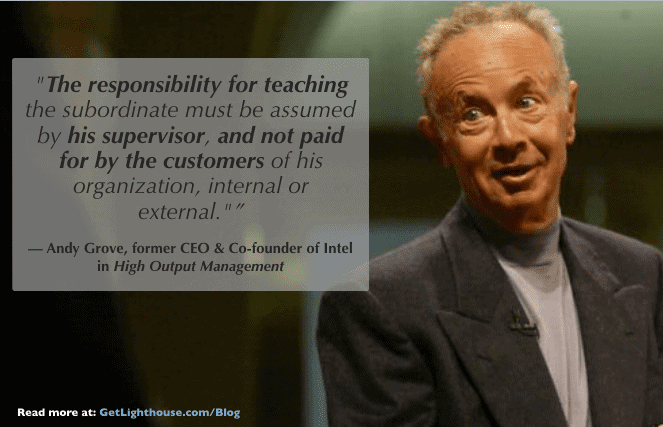
Delegating vs. Stepping in
It can be difficult deciding which tasks you should handle yourself and which should be delegated, even if you have someone willing to take it off your back.
At what point do you let a particular employee run with something themselves? When do you step in? How do you know if you should step in or not?
Keith Rabois, Partner at Khosla Ventures and former COO of Square, spoke at Stanford in 2014 about balancing delegation vs. micromanaging and gave a great example of how to approach the balance between accountability vs. responsibility.
Rabois gave the example of a classic newspaper relationship between an editor and their writers.
As he explains, as a leader you're an editor more than you are a writer. While you're not doing most of the actual individual contributor work, you are 100% responsible for the quality and result of the work your team produces.
He suggests using task-relevant maturity, as mentioned in Andy Grove's High Output Management, as a guide, shifting the way you manage an employee based on the employee's task-relevant maturity, between completely delegating and micromanaging.
Rabois then offered this framework for deciding which tasks to delegate vs. which you should step in and do yourself:
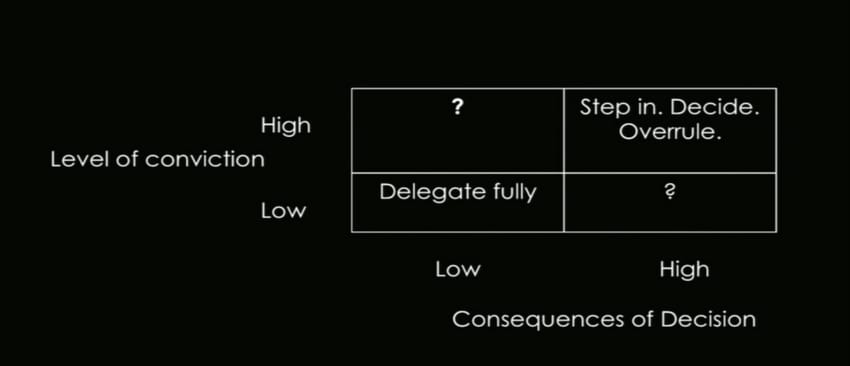
Your conviction vs. consequences for deciding when to step in
First, he suggests jotting your own conviction level down on the grid, somewhere between extremely high to extremely low. As he puts it:
"There are times when you know something's a mistake, and there are times where you wouldn't do it that way, but you have no real idea whether it's the right or wrong answer."
Next, put down what you estimate are the consequences of the decision or task. What happens if things don't go well? Rabois says:
"There are things that if you make the wrong decision are actually catastrophic to your company and you will fail. There are things that are pretty low impact, that really at the end of the day aren't going to make a big difference."
Obviously, the higher the risk, the more caution you should have.
Whether that means being hands on with the person, or not delegating the task at all, is up to you. However, it's important to clearly identify which are high risk tasks, so you can manage them accordingly. As Rabois puts it, you should take control of a task or decision, "where the consequences are extremely dramatic and you have extremely high conviction that you're right.”
Meanwhile, you have the opportunity to help your people grow when you see that it's a low risk project, as Rabois said:
"...where there are low consequences, and you have very low confidence in your own opinion, you should absolutely delegate, and delegate completely. Let people make mistakes and learn.”
By understanding the stakes of a project and the skill level of your team member for that task, you can judge how hands on to be, and better invest your time across all the projects your team is involved in.
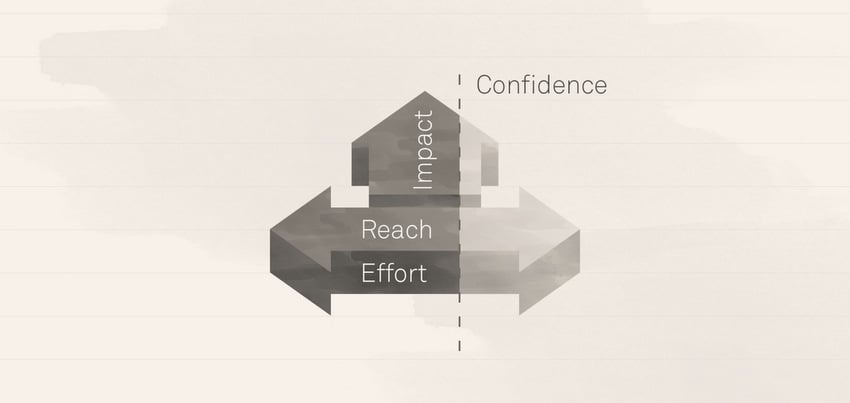
Use RICE to find which tasks to prioritize
RICE is another common prioritization and decision making framework that can help you figure out which tasks to prioritize and which should be delegated.
In a detailed post on the topic, Intercom Product Manager Sean McBride suggests running through the 4 parts of the acronym, asking these questions and using the suggested metrics, for a rough score:
- Reach: How many customers will this impact? (Within a defined time period)
- Impact: How much will this impact each customer? (McBride suggests: Massive = 3x, High = 2x, Medium = 1x, Low = 0.5x, Minimal = 0.25x.)
- Confidence: And how confident are you in your estimates? (Use a percentage from 0-100%)
- Effort: Estimate the amount of time a project will require from all participating members of your team. McBride suggests estimating this as a certain number of "person-months”: the work a team member can do in a single month toward the task.
Once you have your numbers, plug them into this formula to get an estimate of which tasks to prioritize:
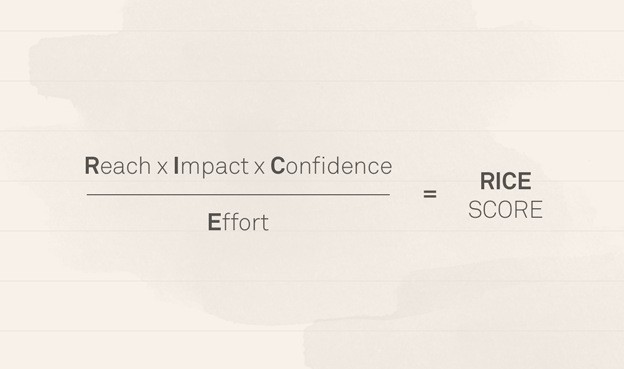
RICE can help you decide which tasks to focus you and your team's efforts on. It can also help you think through which individuals may be the right fit for a task; the effort a task may take one team member to complete may differ greatly from others.
Keep in mind that RICE is far from perfect. The scores you come up with shouldn't be taken as the end-all value of a task. There could be other factors that your calculation didn't account for, and using the process exactly as it's described can be a bit heavy for daily use.
With that said, it's a helpful framework to give you a better idea of where you should focus your time, and make sure you have thought through the consequences of your decision.
RICE, Task Relevant Maturity, Keith Rabois's process, and the Monkey are all frameworks to help you think through and make better decisions. When you improve your decision making ability and how you allocate your time, you will find that you get much better results on the projects you and your team take on.
You also then will find it easier to strike the right balance between accountability vs. responsibility between you and your team.
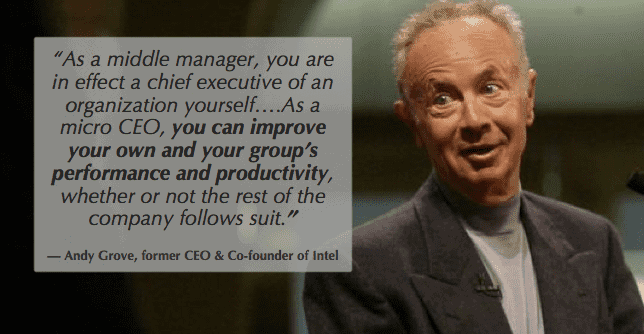
3) Set a good example
As former Intel CEO Andy Grove wrote, you have the power to improve your team's performance, and are ultimately responsible for them.
However, to do that first requires that you take responsibility for what goes on in your team. If you don't take responsibility for what's happening, you can't begin to fix your team's problems or improve its performance.
Taking responsibility has another unexpected benefit, though: it gets your team to take responsibility themselves through seeing the example you set.
Here's a follow-up in my response to David Spinks from earlier highlighting this:
Bonus: when you take responsibility for how you contribute to a problem and work to resolve it, it becomes safer for your team to admit mistakes, ask for help, and also take responsibility.
— Jason Evanish (@Evanish) July 12, 2019
The only way you'll get your team to take responsibility for their own work is through leading by example.
If the example you set is one of brushing off responsibility and blaming your team when things go wrong, your team members will do the same. That cycle of blame will then go on endlessly, with problems being left perpetually unsolved.
Taking responsibility
In his TEDx talk at the University of Nevada, former Navy SEAL Jocko Willink spoke about taking responsibility in the most extreme circumstances:
When his team got caught in a bad situation during a mission in the city of Ramadi, Iraq, in 2005, friendly fire was exchanged and the accident cost his team several injuries as well as the death of a friendly Iraqi soldier.
After the incident, Willink was called to meet with his commanding officers for a debrief. He knew someone was going to have to answer for what had happened.
During the meeting, Jocko went through his team members and asked them each individually, in front of his commanding officers, who was responsible for what had happened. Each team member cited their own individual mistakes relative to their role.
After they were done, he told them they were all wrong, it was he who was responsible for what had happened as their leader. He took responsibility and outlined in specific detail the actions he would take with his team to ensure that mistake never happened again. As he recalls:
"My men didn't lose respect for me. Instead, they realized that I would never shirk responsibility, and I would never pass that heavy burden of command down the chain and onto them.
And you know what? They had the same attitude. Unlike a team where no one takes ownership of the problems, and therefore, the problems never get solved, with us, everyone took ownership of their mistakes, everyone took ownership of the problems. And when a team takes ownership of its problems, the problems get solved.”
You may not be commanding a team of soldiers in Iraq, but the same results hold true. If you're accountable and take responsibility, your team will as well.
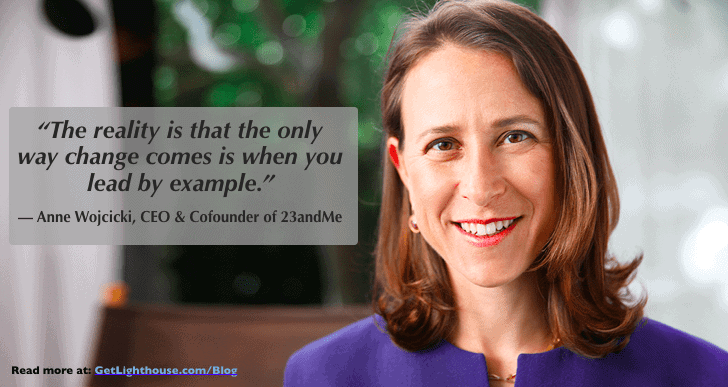
Responsibility breeds responsibility
Willink knew he wasn't the only one responsible for what happened, but he was the leader, so he was accountable for the team's results. If he had deflected blame to his team, he would have set the wrong example – and his team would have followed that example.
As Ben Horowitz wrote on the topic of Andrew Mason's resignation letter as CEO of Groupon:
"Andrew does the stand up thing and claims accountability. Make no mistake though—although he's the only one accountable, he's certainly not the only one responsible for all the things that went wrong….But here as in every case, it's not all the CEO's doing, but it's all the CEO's fault.”
Taking responsibility isn't just about fixing problems yourself, it's about setting the example so your entire team takes responsibility for the team's performance.
If you take responsibility, and your team sees it, they'll follow suit.
Even though you aren't always the one directly responsible for a problem, you have to stay accountable to whether there was a good outcome. There is always something you could have done (or not done) to change it.
Keep this in mind, and demonstrate it in how you communicate with your team, and you may be surprised how well the team responds to what they should be responsible and accountable for as well.

Find the right balance
Striking the right balance for how hands on you are with your team, what you delegate, and how you act when things don't go to plan can make all the difference. That's why they're essential to striking the right balance in how you handle accountability vs. responsibility for yourself and your team.
In doing so, you may find you:
- Improve the quality of your team's work
- Boost engagement and motivation
- Improve communication
- And, ultimately, help you become a better leader
A change like this will not happen overnight, but it's one of the most critical skillsets to master if you want to advance as a leader.
No one wants to follow the leader who dodges responsibility and passes blame. Meanwhile, the leader that makes it safe to bring up issues, delegates well, and takes ownership of problems and failures will always have people wanting to work with them.


